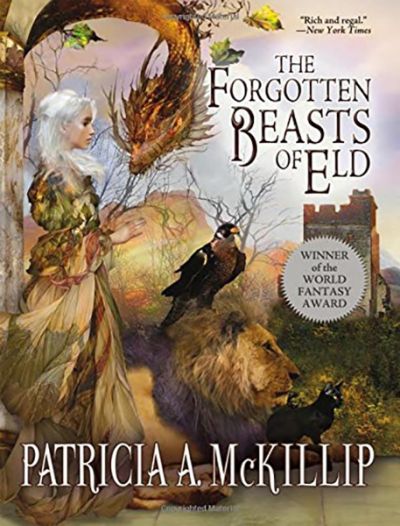The Moon in Her Eye
The Forgotten Beasts of Eld
By Patricia A. McKillip

3 Sep, 2017
1974’s standalone secondary world fantasy The Forgotten Beasts of Eld was Patricia A. McKillip’s second fantasy novel. It won the World Fantasy Award and was nominated for the Mythopoeic Fantasy Award1.
Raised in isolation by her mage father, the ice-white lady Sybel is content to live with her menagerie of fantastic beasts. She knows nothing of the company of humans and cares naught for the lack.
This does not prevent a stranger from arriving on her doorstep, bearing a child whom he means to foist on her.
Sybel’s uninvited guest is Coren of Sirle and the child is Tamlorn, son of Rianna, Queen of Eldwold. This lofty ancestry would be an asset for the child if only his father had been Drede, King of Eldwold. Rianna had fallen in love with Norrel, and Coren believes (incorrectly) that Tamlorn is Norrel’s son. Drede was unhappy with his wife’s love for another. Both Rianna died in child birth and Norrel died in battle with the King. Tamlorn is in danger of an early death (neglect or murder). Coren wants Sybel to take Tamlorn and keep him safe.
Although dubious of her ability to care for a human child, Sybel reluctantly accepts the baby. With the help of local witch Maelga, Sybel manages to raise the boy, keeping from him the knowledge of who his parents were. Although his childhood is by many measures an odd one, surrounded as it is by creatures of legend, it is a happy one.
The outside world is not content to leave mother and adopted son alone. As Drede’s sole heir, Tamlorn is potentially valuable to both sides of a long and bitter conflict: Coren, as the latest lord of Sirle, rebelling against Drede. Sybel must decide between the claims of Coren (to whom she is attracted) and Drede (Tamlorn’s acknowledged father). Convinced that Tamlorn’s best hope for happiness is with his father, Sybel allows Tamlorn to leave with Drede.
Drede did not become the king of a strife-torn kingdom by knowing when to leave well enough alone. Terrified by the power Sybel manifested, Drede hires a wizard of his own, someone he hopes will make Sybel into Drede’s enchantress slave. The wizard does not long survive his attempt to bind Sybel. Drede survives only because Sybel wants to savour her revenge.
She is careless of the cost in part thanks to her wrath, but also because she does not fully grasp what that cost will be.…
~oOo~
Although a passing reference indicates this is set in the same world as 1976’s The Riddlemaster of Hed, one does not have to have read Riddlemaster before reading this, or this before reading Riddlemaster. This is a relic of a now long-vanished age, when fantasy novels were expected to stand on their own two legs. Or covers.
It takes a special kind of stupid to embrace a strategy whose winning scenario is having a ticking time bomb of a bound wizard in one’s court. There’s a reason why almost everyone is extremely careful to be polite to wizards and witches and why do mages tend to be either standoffish (if their hobbies don’t involve humans) or terrifying (if they do). Sybel’s father was a monster who called Sybel’s mother to him with magic (wizards are unclear on the concept of consent). It would have served Drede well to consider what would happen if his bold scheme were to fail.
For her part, being raised by a mage and spending her life with animals has denied Sybel many of the basic skills she needs to navigate her unexpectedly complicated life. She expected she would have to have an heir at some point (and thus a child), but actually raising a baby is well outside her core skillset. So is falling in love with Coren or dealing with their inevitable conflicts without resorting to magic. There is quite a lot she does not know. It takes her much of the book to learn it.
McKillip’s skilful prose makes this novel memorable. While contemporaries like Dickson (The Dragon and the George) wrote in a passable contemporary vernacular, others like Brooks (The Sword of Shannara) delivered prose that clanked and thumped. Donaldson, another fantasy writer, carried out a long-winded, two-fisted assault on the English language, McKillip opts for lyricism. The result is dreamlike, which is entirely suitable for a modern fairy tale.
The Forgotten Beasts of Eld is available here (Amazon) and here (Chapters-Indigo).
Feel free to comment here. Strike that: COMMENTS ARE BACK,
Please direct corrections to jdnicoll at panix dot com.
1: It lost to Poul Anderson’s A Midsummer Tempest. It was a strong year for the Mythopoeic Award:
Mythopoeic Fantasy Award
- Win A Midsummer Tempest by Poul Anderson
- Nomination How Are the Mighty Fallen by Thomas Burnett Swann
- Nomination Merlin’s Ring by H. Warner Munn
- Nomination Prince of Annwn by Evangeline Walton
- Nomination The Forgotten Beasts of Eld by Patricia A. McKillip
- Nomination Watership Down by Richard Adams
Mythopoeic Scholarship Award (for Inkling Studies)
- Win C. S. Lewis: A Biography Roger Lancelyn Green and Walter Hooper
I will admit all I recall of the Anderson is the premise — a world in which Shakespeare was a historian, not a writer with a talent for anachronism and a poor grasp of geography — not the actual story.
